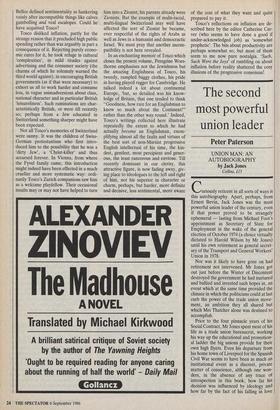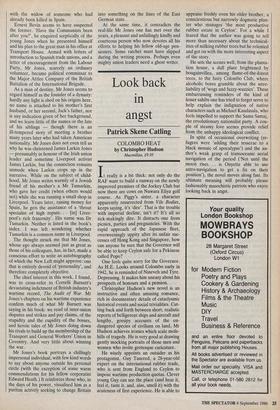The second most powerful union leader
Peter Paterson
UNION MAN: AN AUTOBIOGRAPHY by Jack Jones
Collins, f15
Curiously reticent in all sorts of ways is this autobiography. Apart, perhaps, from Ernest Bevin, Jack Jones was the most powerful union leader of the century, even if that power proved to be strangely ephemeral — lasting from Michael Foot's appointment as Secretary of State for Employment in the wake of the general election of October 1974 (a choice virtually dictated to Harold Wilson by Mr Jones) until his own retirement as general secret- ary of the Transport and General Workers' Union in 1978.
Nor was it likely to have gone on had retirement not intervened. Mr Jones got out just before the Winter of Discontent destroyed the government he had nurtured and bullied and invested such hopes in, an event which at the same time provided the climate in which the politicians could at last curb the power of the trade union move- ment, an ambition they all shared but which Mrs Thatcher alone was destined to accomplish.
Prior to the four pinnacle years of his Social Contract, Mr Jones spent most of his life as a trade union bureaucrat, working his way up the educational and promotion- al ladder the big unions provide for their own high flyers. Even his departure from his home town of Liverpool for the Spanish Civil War seems to have been as much an institutional event as a discreet, private matter of conscience, although one won- ders, in the absence of any trace of introspection in this book, how far his decision was influenced by ideology and how far by the fact of his falling in love with the widow of someone who had already been killed in Spain.
Ernest Bevin seems to have suspected the former. 'Have the Communists been after you?', he enquired sceptically of the young Jones when he presented himself and his plan to the great man in his office at Transport House. Armed with letters of introduction to Spanish trade unions, and a letter of encouragement from the Labour Party, Mr Jones, scarcely an ordinary volunteer, became political commissar to the Major Attlee Company of the British Battalion of the International Brigade.
As a man of destiny, Mr Jones seems to regard himself as the founder of a dynasty: hardly any light is shed on his origins here, no name is attached to his mother's first husband, or her second, Jack's father, nor is any indication given of her background, and we learn little of the names or the fate of his siblings — though there is an ill-tempered story of meeting a brother many years later who had taken American nationality. Mr Jones does not even tell us why he was christened James Larkin Jones — presumably in honour of the Irish union leader and sometime Liverpool activist James Larkin, but the connection remains unmade when Larkin crops up in the narrative. While on the subject of child- hood, Mr Jones writes warmly of a Jewish friend of his mother's a Mr Tumarkin, who gave her credit (when others would not) while she was running a small shop in Liverpool. Years later, raising money for Spain, he gets the assistance of a 'throat specialist of high repute. . . [in] Liver- pool's rich fraternity'. His name was Dr Tumarkin. Neither is listed in the book's index. I was left wondering whether Tumarkin is a common name in Liverpool.
The thought struck me that Mr Jones, whose ego always seemed just as great as those of his colleagues, has, in fact, made a conscious effort to write an autobiography of which the New Left might approve: one that is entirely devoid of 'personality', and therefore completely objective.
The chief interest in this work, I found, was to cross-refer to Correlli Barnett's devastating indictment of British industry's wartime record, The Audit of War. Mr Jones's chapters on his wartime experience confirm much of what Mr Barnett was saying in his book: we read of inter-union disputes and strikes and pay claims, of the stupidity and the cupidity of the bosses, and heroic tales of Mr Jones doing down his rivals to build up the membership of the Transport and General Workers' Union in Coventry. And very little about winning the war.
Mr Jones's book portrays a chillingly impersonal individual, with few kind words to say about anyone outside his personal circle (with the exception of some warm commendations for his fellow corporatist Edward Heath.) It reinforces those who, in the days of his power, visualised him as a puritan actively seeking to change Britain into something on the lines of the East German state.
At the same time, it contradicts the real-life Mr Jones one has met over the years, a pleasant and unfailingly kindly and courteous person who now devotes all his efforts to helping his fellow old-age pen- sioners. Some ratchet must have slipped during the writing process. Perhaps even mighty union leaders need a ghost writer.







































 Previous page
Previous page